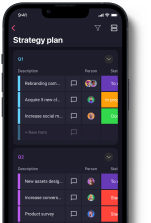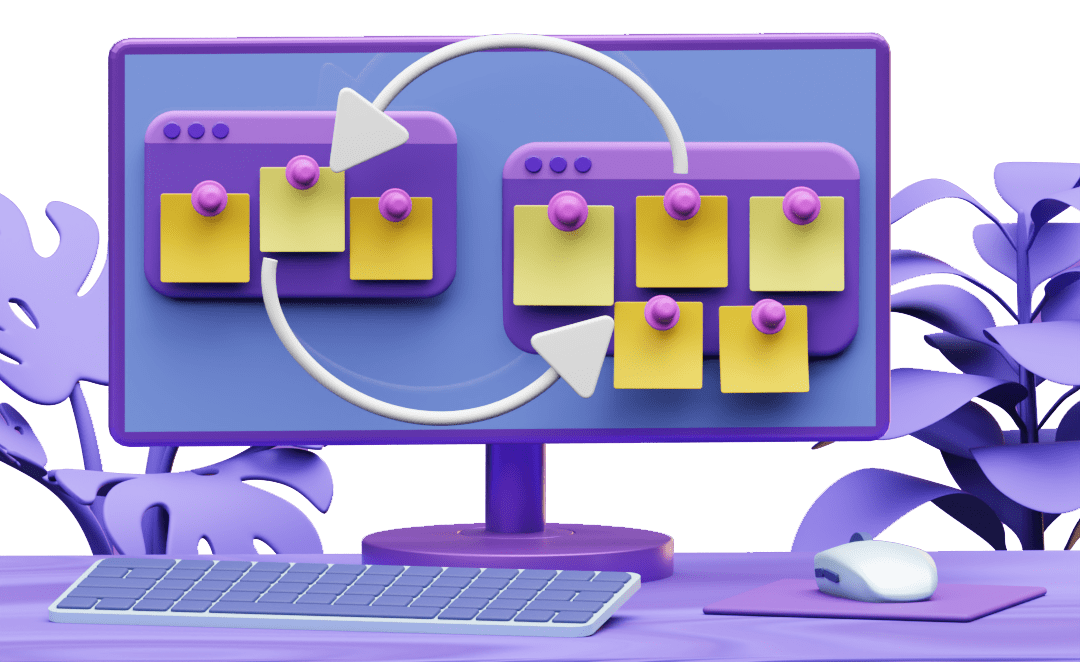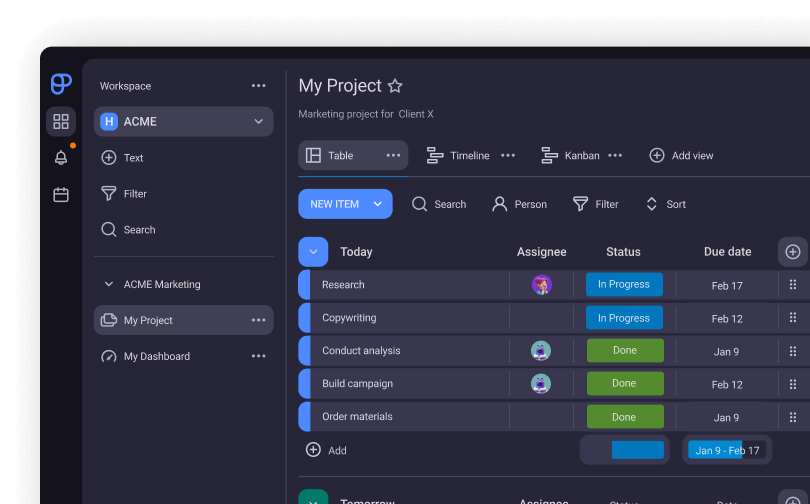25 Key Project Management Skills to Make You Stand Out
Every job requires a specific set of skills. Typically, the more complex the position, the more numerous the skill requirements. However, few positions can match the sheer number of skills required to be a project manager.
Throughout the project lifecycle, the project manager’s immediate duties change several times over, so that, at times, it can feel like regularly switching jobs.
Therefore, project managers must continuously work on improving their hard and soft skills if they wish to perform their jobs effectively. In this article, you’ll find out exactly what those skills are, why they’re important, and how you can improve them.
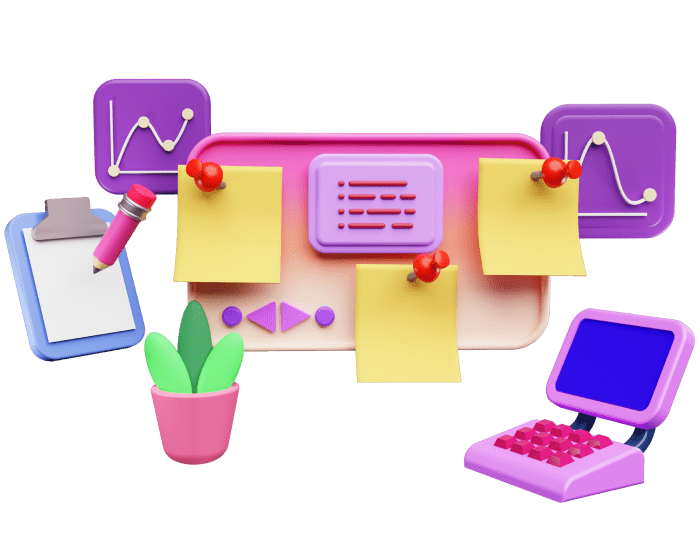
Table of Contents
What are project management skills?
Project management skills are a set of competencies necessary to see a project to completion. They ensure both efficiency and effectiveness in your role as a project manager. In turn, your project success chance skyrockets.
These are skills that every project manager needs to obtain, develop, and utilize on every project they work on. You’ll notice that some of these skills are broad — this means they are useful even outside of the project management setting and can be utilized in most positions.
The list of project management skills
Let’s take a look at an overview of every project management skill we will be covering in this article:
- Project planning,
- Budget management,
- Task management,
- Risk management,
- Project management software usage,
- Project management methodology implementation,
- Technical writing,
- Technical skills,
- Leadership,
- Collaboration,
- Time management,
- Problem-solving,
- Negotiation,
- Organizational skills,
- Communication,
- Planning,
- Adaptability,
- Project forecasting,
- Workload management,
- Project scoping,
- Change management,
- Motivational skills,
- Interpersonal skills,
- Emotional intelligence, and
- Conflict resolution.
Hard skills you need for project management
Hard skills are all skills that can be learned through education or training. They are teachable, quantifiable, or both.
If there exists a degree for something, then that something is a hard skill.
For example, a language degree quantifies your knowledge of a certain language.
Proficient use of Microsoft Excel is also a hard skill, as is UX design, graphics design, editing, typing speed, statistical analysis, network security, bus driving, and so on.
For a project manager’s CV to look impressive, it would ideally be decorated with all of the following hard skills:
- Project planning,
- Risk management,
- Technical skills,
- Task management,
- Budget management,
- Project management methodologies,
- Project management software, and
- Documentation skills.
Now let’s take a look at what each of these hard skills entails in more detail.
Project planning skills
Project planning skills enable you to build the foundation on which the budget, timeline, and scope of the project will rest in perfect harmony.
Creating a project plan may well be considered the most important hard skill for project managers to master. Not that any of the other skills are unimportant, but most of them require a solid plan to work off of.
Your budget management skills could be world-class, but this won’t help if you fail to deduce the proper size of the budget during the project planning phase.
Likewise, your task management skills could be unparalleled, but if you fail to correctly calculate the required workforce for the given timeline, you simply won’t be able to get the team to do everything that’s needed.
Budget management skills
When it comes to budget management, project managers need to meticulously account for all the costs the project in question demands.
Among other things, this includes the costs of:
- Labor,
- Parts,
- Services,
- Marketing, and
- Equipment.
Complex, perhaps — but nothing that good old arithmetics can’t handle.
However, budget management isn’t contained to project planning — it’s a daily concern throughout any project’s entire life cycle.
For example, it’s the project manager’s job to negotiate prices with vendors and subcontractors. They also have to keep the budget in mind while prioritizing in the face of pressing issues.
There is a lot of overlap between budget management and risk management. After all, how you handle the budget in the face of impending risks has a direct bearing on the overall quality of project deliverables.
It’s not uncommon for projects to last for several years, during which time they may encounter:
- Inflation,
- Part shortages,
- Market crashes, or
- Global pandemics.
Each and every one of these risks demands great effort with regard to budget estimates if the project is to be successful.
Task management skills
Task management refers to the way in which the activities covered by the project scope are carried out and monitored. In other words, they show how good the project manager is at seeing the project plan through and moving things along.
Paramount to task management is proper sequencing — i.e. how to organize the task to allow for the most optimal workflow.
Some tasks can be done independently of others.
Some need to be done simultaneously.
And some require a certain framework to be built upon.
Improper sequencing can quickly lead to bottlenecks — especially when work on certain tasks can’t commence without prior completion of previous tasks. For this, you need to be aware of the task dependencies — the ways in which project tasks are connected and influence one another.
Project management software tools help immensely with the visualization and efficiency of sequencing — but they are no more than tools that competent project managers employ to facilitate their workflow.
A project manager is expected to have a firm understanding of the project’s progress at all times.
Comparing the completion of tasks with preset milestones set out during project planning is merely one way of accomplishing this task.
💡Plaky Pro Tip
If you want to learn more about task management, you might want to check out the critical path method:
Risk management skills
Anything that can negatively impact a project is categorized as a risk. Project risk management categorizes even things that can positively impact the project as risks — but we won’t focus on that for now.
And when we say anything, we really do mean it. Some examples include:
- Part shortage,
- Price inflation,
- Employee illness,
- Scope creep,
- Power outages,
- Floods,
- Storms, and
- Aggressive competition.
It is the project manager’s job to identify these potential risks and evaluate the potential severity of their negative impact and the likelihood of their occurrence.
Once this is done, they can work on creating risk mitigation plans, where they search for a solution for everything that could go wrong.
A clearly defined plan that includes proper risk management is one of the critical success factors for project managers.
If successfully implemented, risk management can enable the team to assume a proactive approach to realizing the project’s goals.
Conversely, a lack of risk management dooms the team to a reactive approach, where each issue has to be dealt with as it occurs with no prior strategy.
Project management software skills
As reported by PwC, PM tools contribute to the project’s success. As per their insights, 77% of high-performing projects are reported to have used a PM tool.
Stats don’t lie and, in this case, Capterra’s Project Management Software Market Research Report tells us that project management tools improve:
- Timeline estimations by 60%,
- Resource use effectiveness by 55%,
- Team communication by 49%, and
- Budget estimation by 48%.
Slowly but surely, these tools are becoming essential for project managers.
If this extensive list of hard skill requirements for project managers makes one thing clear, it’s that project managers have a lot on their plate. Project management software like Plaky helps make some of these tasks more manageable.
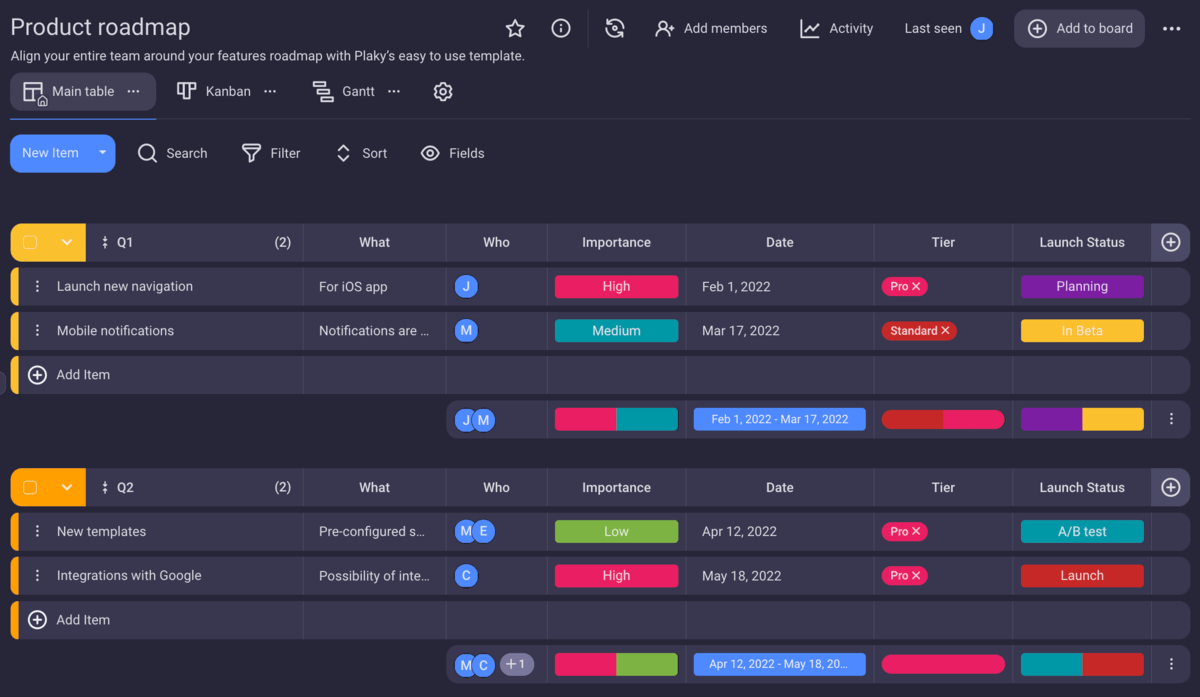
Perhaps most importantly, project management software allows you to centralize team and client communication, resulting in nearly a 50% drop-off in communication, as we can see in the statistics listed above.
Project management methodology implementation
Every project is unique — whether by the industry it’s in or the nature of the project. So, project managers need to be able to implement the right methodology for the right project.
There exists a large number of proven project management methodologies that include but are not limited to:
Different methodologies lend themselves to different projects.
It’s up to the project manager to decide which methodology to rely on.
This isn’t to say that project managers are expected to be masters of every methodology. However, working knowledge or at least a basic understanding of each one is desired, as this allows them to approach each project in a manner best suited to it.
For example, the Agile Manifesto clearly states that the purpose of this methodology is to streamline and improve software development — so software development is where it finds the most use.
Project managers need to be aware of the pros and cons of each methodology and make their choices accordingly.
💡Plaky Pro Tip
Learn how to choose the project management methodology that’s right for you:
Technical writing skills
Technical writing — or documentation — is, of course, a crucial skill required to create a project plan.
But the need for it extends beyond just project planning. A project manager is required to keep detailed and up-to-date documentation on everything related to the project. This includes plans, progress updates, reports, and so on.
Let’s look at the concept of documentation through the prism of an actual project management methodology.
The Waterfall methodology doubles down on documentation. The idea is to document everything down to the smallest details so that even a change in team members won’t slow down the pace of the project. New recruits can study up on the documentation and pick up right where the old team member left off.
Regardless of whether you employ the Waterfall methodology or not, though, your technical writing skills need to be outstanding if you are to flourish as a project manager.
Technical skills
While arguably the least important hard skill listed here, working knowledge of the subject matter pertaining to the project is invaluable.
For example, by having a working knowledge of software development, a project manager in charge of developing a piece of software can:
- Make more accurate project estimates,
- Give more detailed instructions to project team members, and
- Comprehend the progress of the project more intuitively.
If nothing else, this would help them better understand the potential software-specific risks the project might encounter.
Conversely, this same manager would not be able to navigate a skyscraper construction project as efficiently. That’s where a project manager with intimate knowledge of construction techniques and challenges would be more suitable.
This is why many project managers stick to one development field.
However, this hard skill isn’t always a requirement. The rest of the hard and soft skills listed here can make up for it.
But if you’ve already got the relevant technical know-how — flaunt it!
It can and will give you the edge over other project managers applying for the same project.
Soft skills you need for project management
Soft skills are more difficult to learn, but they are attained. Soft skills reflect how you are as a person and your approach to work.
This includes everyone’s favorite evergreen hits that can be found on most if not all, CVs, like a “team player” and “open to criticism”.
It’s not uncommon for soft skills to be treated as nice-to-haves for some jobs. But, when it comes to project managers, the following soft skills are, at the very least, just as important as the hard skills listed above:
- Leadership skills,
- Communication skills,
- Time management skills,
- Problem-solving skills,
- Negotiation skills, and
- Adaptability.
Leadership skills
While project manager is the conventional title, you can also refer to them as project leaders, as the responsibilities they hold require plenty of leadership.
Without proper leadership skills and the right attitude, project managers won’t get far, no matter how proficient they are at all the required hard skills.
Project managers bear sole accountability for their projects. This means the pressure is on them to deliver. And, since project success depends on the collective effort of multiple people, it’s up to project managers to expertly steer them toward project completion.
Collaboration skills
Collaboration is key for any project — when it’s lacking, it can lead to a decrease in productivity, missed deadlines, and a lack of clear objectives.
Your team, more than anything, will appreciate a culture centered around project collaboration. It’s unsatisfying to work in an environment where tasks are unclear, communication is not transparent, and teams don’t share information amongst themselves.
Nowadays, the lives of project managers are made infinitely easier thanks to both project management software and dedicated team collaboration tools like Pumble. They can facilitate both synchronous and asynchronous team communication — which plays a large role in collaboration.
But, software can only enhance what’s already there. You need to maintain a transparent collaboration network by yourself. After all, open and effective communication is another critical success factor you’ll have to pay attention to.
Time management skills
When you think about it, time management is already necessitated by hard skills such as project planning and task management.
But this doesn’t paint the whole picture.
We might call this time management on a macro level, meaning long-term and team-wide.
But, project managers also have to be masters of time management on a micro level — i.e. throughout the day.
In other words, project managers must be as organized when it comes to their day-to-day activities as they are when approaching the project as a whole.
Prospective project managers who lack sufficient time management skills will soon find themselves overwhelmed by the various demands that come with the job description.
Problem-solving skills
It’s not uncommon for problems to crop up left and right during a project.
While risk management efforts made during project planning pay dividends during difficult times, it’s still up to the project manager to take care of problems.
Furthermore, no matter the experience level of a project manager, nothing short of clairvoyance will enable them to predict every potential issue.
Thus, a project manager needs to be someone who can think on their feet and find quick yet effective solutions even for unprecedented issues.
Otherwise, why would projects require project managers past the planning stage?
Negotiation skills
Project managers must be effective negotiators.
They need to negotiate prices and make cases for the initial budgets and possible budget increases. Also, project managers need to be the ones to keep the project in check and safe from unrealistically ambitious clients who would otherwise expose it to scope creep, and so on.
It’s the project manager’s job to ensure that all stakeholders are happy and that the project is running smoothly at the same time.
It wouldn’t be an exaggeration to instead call this soft skill diplomacy.
Organizational skills
Since projects are made up of so many moving parts, project managers need to stay on their toes to tackle them all — using their organizational skills.
Organizational skills require you to use time management, task management, and other project management skills in tandem in order to tackle the project as a whole.
A great way to stay organized is to document every step of your project. Then, if any issues appear, you might find the source — or the solution — at the tip of your fingers.
💡 Plaky Pro Tip
It’s clear that these management skills are important for effective project management, but if you’re unsure as to why project management is important in the first place, we suggest checking out this guide:
Skills chosen by experts: What are the most important skills of a project manager?
Now that we’ve listed the most important skills that you need to become a successful project manager — what should you focus on first?
We’ve spoken with experts in project management, and most of them agree that soft skills are the backbone of every project, and therefore the most important.
Most universities, such as Elmhurst University, prioritize soft skills over hard ones when listing the most important skills a project manager needs to have.
Skill #1: Communication
A project can easily fall apart without communication, and Alexander Havkin, who’s been Project Manager at Ecoline Windows for over 9 years, tells us of this risk:

“The crown jewel of project management skills includes communication. This is the glue that holds a project together. Efficiently conveying ideas, updates, and feedback ensures everyone’s on the same page.”
If your team communicates effectively, teamwork will skyrocket, and so will the chances of the project’s success. On the other hand, communication in project management doesn’t revolve just around your team.
To expand our idea of communication, Annie Raygoza, Director of Client Services at Clear Digital, shared with us how client communication is just as important:

“Understanding the client’s needs, goals, and what success looks like specifically to them [is highly important]. Throw out assumptions and drill beyond the surface-level questions to discover these valuable nuggets of information.”
Annie adds what constitutes good project communication:

”Communication includes multiple touch-points, the ability to be agile based on the client you’re working with, and adjusting the level of education/coaching you need to provide to the client to ensure they feel comfortable, confident, and aligned with where the project stands at any given time. Surprises should never come up, and a partnership grows when this level of communication is executed properly.”
Your clients are just as important in your project, as they can affect your project’s success just as much as your team can. Find out what it is your clients need, and you’ll know what you and your team need to focus on during the course of your project.
Approach every client interaction as if it’s the first one. Implement active listening and let your clients have more space in the conversation than you.
The information you gather and the partnerships you form with clients will be crucial to your project.
💡Plaky Pro Tip
If you want to learn more about the importance of communication in project management, check out this article:
Skill #2: Planning
It’s impossible to go into any project blindly. That’s why planning skills are a requirement for any project manager.
We spoke to Samantha Miller, General Manager at Express Dentist, who turned our heads to the earliest determinant of a project’s success:

“The task of a project manager is indeed a daunting one, however, the success of every project is determined first of all, by/from the effectiveness of the planning. The truth is that a lot of careful thought and consideration is required to ensure that the execution of a project goes as smoothly as is desired, and because all the thinking and brainstorming needed would most likely overwhelm a single individual, a good project manager should be okay with not just delegating sensitive tasks, but open to acknowledging and incorporating the good ideas from the members of his team.”
Here, Samantha tells us of a great way to mix soft skills with the skill she deems most important. If you can lead your team and establish a collaborative environment, delegating tasks will be natural, and even beneficial.
And, if your teamwork is on point, whenever you get stuck in the planning process, you can consult your team.
For example, if you’re unsure of how long it’ll take to perform certain tasks, ask your team and they’re sure to know the answer — it’s in their expertise, after all.
Skill #3: Adaptability
In the world of project management, especially in today’s day and age, things are constantly changing. The market shifts constantly, and the progress of technology is exponentially growing.
That’s why Lou Reverchuk, Co-Founder and CEO of Echo, advised us that now, more than ever, staying flexible is necessary:

“Adaptability is equally important [as communication], especially in the rapidly evolving tech industry. Project managers must be able to pivot when new technologies emerge or when unforeseen challenges arise, and adapt the strategy accordingly.”
Project managers need to be ready to adapt their planning at the drop of a hat, to accommodate for sudden and unpredictable changes.
Even though being proactive is generally the goal of project managers, if the change is sudden, you need to be reactive. Still, you need the ability to react as efficiently as possible.
Skills chosen by the Plaky content team
There are plenty more skills to learn when becoming a project manager.
Considering that the Plaky content team is continually working on delivering quality content on everything related to project management — so, we’re well versed on the topic — we’ve listed a few more skills that we deem crucial for the development of any successful project manager.
Project forecasting
Project forecasting skills involve using information gathered from the project environment to predict how it will affect the project and what changes need to be made.
While project forecasting is crucial to project planning, you also need to utilize it during the project itself, as future changes in the environment will require appropriate responses.
Project forecasting is vital to:
- Increasing the project’s success chance,
- Reducing risk, and
- Calculating results.
Failing to properly forecast during your project can lead to missing vital pieces of information that might affect it — in the worst case, it can lead to complete project failure.
Workload management
Workload management doesn’t concern itself with all of the tasks in a project, but rather the tasks of an individual.
It includes planning the tasks for each individual in your team in relation to:
- Their expertise,
- The number of tasks they already need to perform,
- The number of tasks other team members perform, and
- Forecasting future tasks.
Proper workload management ensures that no team member is overburdened, or has hard feelings towards other members of the team for uneven task distribution.
Project scoping
Scope management is essential for a project, as an unmonitored scope can blow out of proportion quickly.
If you keep adding project resources whenever they’re scarce or keep expanding deadlines whenever a timeline issue appears, your project may succumb to scope creep.
It’s a project manager’s job to keep this in control — to determine when and how an expansion of a certain piece of the project is necessary, and when it is harmful.
Change management
Over the course of a project, you’re bound to encounter certain changes. Whether it be a new software you’ll use, a change in organizational processes, or something else.
Change management is the process of getting your team prepared for this change, and supporting them along the way.
Getting used to a new environment can be difficult for any individual, especially in a work environment. If you make sure that each team member is given the mental and physical tools for accepting change, they’ll have an easier time adapting.
Furthermore, if you fail to make the necessary preparations for a change, your team will more than likely not be able to adapt to it. As a result, deadlines will be missed, information may be lost, and the mood among team members might quickly go in a negative direction.
Motivational skills
As the leader of a project, you’ll need to motivate your team if you want them to stay productive and in high spirits.
Motivational skills are a key aspect of leadership — not only do they increase productivity, but they increase the quality of a product as well. When you properly motivate your team, it builds loyalty, which pushes them to be more productive and dedicated.
Some of the methods you can use to motivate your team include:
- Positive reinforcement,
- Team building activities,
- Reliability, and
- General positivity.
As with most aspects of their work, your team will be led by your example. So, you need to be motivated and positive in your work in order for those traits to influence others.
Interpersonal skills
To improve your communication skills, you need to pay attention to their roots — interpersonal skills.
Since you’ll be interacting with many different people in your professional career, you’ll need to be aware of how to properly conduct yourself in relation to the person you’re speaking to.
Interpersonal skills are influenced by social intelligence, which is comprised of:
- Social awareness — the ability to notice and understand the thoughts and feelings of others, and
- Social facility — knowing how to react to them.
Emotional intelligence
Emotional intelligence allows you to understand the emotions of both yourself and others. This understanding will improve your approach to communication.
According to PMBOK 7th Edition, emotional intelligence is comprised of 4 parts:
- Self-awareness — the ability to know how your emotions affect you and how you and your surroundings affect your emotions,
- Self-management — the ability to control your behavior and not act on emotion-driven impulses,
- Social awareness — the ability to know others’ feelings and how their behavior will be affected by them, and
- Social skill — the ability to build relationships and navigate others’ emotions through communication.
Conflict-resolution skills
Workplace conflict is almost a guarantee in every project. It seems scary, but it’s perfectly normal — and even useful if handled correctly.
Conflict can be productive, yes — but resolving unproductive conflict is a key skill for any project manager to have.
However, resolving conflict doesn’t just mean finding a solution — it’s also about mending the relationship between the parties involved. You need to keep the communication honest and respectful at all times.
You need to be able to shift the focus from the people to the issue. The best solution to any conflict is to find an alternative where both sides get what they want. However, sometimes you’ll have to come to a compromise.
💡 Plaky Pro Tip
Becoming proficient in a new skill can take time and a lot of hard work. Here’s our guide on how to achieve your long-term career goals:
How to improve your project management skills
The requirements for being a project manager are many, but not unachievable.
Soft skills present the biggest hurdle here.
There is no course on adaptability just as there is no certification for problem-solving.
You can read up on these topics and try your best to apply what you’ve read. But, there are no guarantees that simply reading about leadership will turn you into a leader, but it’s a start.
However, if you can master the soft skills, then the rest should be much more manageable.
After all, hard skills are characterized by their teachability — so all that’s required on your part to master them is time and effort.
The following are some of the tried and true methods to improve project management skills.
Tip #1: Study up on relevant literature
With project management books and guides and plenty of dedicated project management resources available online, you’ll find no shortage of relevant literature for improving your knowledge on this subject.
In addition to this guide on project management skills, our project management hub also has detailed guides on many relevant topics. So you’re just a click away from learning what project scope is, what deliverables are, what baselines are, or even what project management is.
If you’ve found this guide helpful and informative, checking out the rest of our project management hub is highly recommended.
Tip #2: Attend project management courses
Many companies outright refuse to consider applications for project manager positions from applicants who don’t have a project management certificate to their name.
To this end, attending a course for project managers may not only be useful but mandatory.
This is also advised by Alexander, who shared his thoughts on project management workshops:

“To foster growth, I recommend attending training and workshops. Dive into specialized courses or workshops. They offer both theoretical knowledge and practical exercises.”
However, even if you don’t need a certificate to land the position of a project manager, it may still help to dip your toes into these waters in a more controlled and guided way.
If this is the case, you can purchase courses on project management through such sites as Udemy and SkillShare.
While these courses don’t carry much weight in companies that require certified project managers, they can act as a good starting point to help you beat the steep learning curve of project management.
Tip #3: Join project management organizations
Those who are serious about project management would do well to join a dedicated project management organization, like:
- PMI (Project Management Institute),
- IMPA (International Project Management Association), or
- APM (Association for Project Management).
Membership in these organizations comes with many perks, not least of which is access to a wealth of paywalled resources and peer groups interested in helping out prospective members.
Tip #4: Experiment with software
Just like accountants need to be intimately familiar with Microsoft Excel, project managers ought to be familiar with project management tools.
The only difference is that there is no de facto Excel for project managers.
Since not all pieces of software are equally suited to all project management methodologies, project managers need to browse and — for lack of a better word — taste-test the software that’s available to them.
Project management statistics show that a paltry 41% of project managers check out more than two project management tools before settling down on the one they’ll use.
While it can be tedious trying out a dozen similar tools, this is a momentous occasion that’s worth the effort.
Tip #5: Learn from experience
Learning by doing is a viable strategy for obtaining many of the skills listed in this guide.
As much as educating yourself on these subjects helps, you need hands-on experience to really refine these skills, or, as Lou says:

“The real test comes when you apply this knowledge in real-world scenarios. Therefore, the second crucial element is hands-on experience, whether it’s leading small internal projects or volunteering for more significant roles within your organization. Experience allows you to make mistakes, learn from them, and ultimately refine your approach.”
Apply for internships, or ask any friend or family member who’s leading a project if you can participate in any way. The goal here is not to have something to put in your portfolio — it’s to have something to put into practice later on.
To be a project manager is to masterfully juggle all the hard and soft skills we’ve mentioned. Still, you don’t need to manage projects to learn individual skills.
Just like Mr. Miyagi taught karate to The Karate Kid by having him do unrelated chores, you can develop some of the skills necessary for project management (even soft skills) by applying them to unrelated real-life situations.
Organizing a camping trip for your friends and family can help develop some communication, leadership, budgeting, and even negotiation skills. Personal Kanban boards and humble one-man projects can even help familiarize you with some project management methodologies.
💡 Plaky Pro Tip
A mastery of many skills is required to become a project manager, but why is this position worth investing so much time into? Perhaps prospective project managers tough it out due to financial incentives, about which you can learn more in this guide:
Tip #6: Take an anonymous opinion poll
Sometimes, it’s difficult for your team to tell you what they think you can improve on. They might see it as negative and therefore fear repercussions for criticism — or just feel awkward about it.
Whichever it is, Samantha gives us a great way to gain sugarcoat-free feedback from your team, in the form of an anonymous questionnaire:

“In my experience, I have learned that the best place to find how and what to improve, especially in a job that requires human interaction, is to ask the people directly involved. However, before venturing into this, I have learned that I have to first of all:
1. Ready myself, and be open to positive criticism.
2. Choose to be unoffended by negative remarks (because they are sure to come).”
This is where emotional intelligence comes into play. You need to be in tune with your feelings in order to respectfully and analytically accept any criticism your team might have.
Learning from previous mistakes is the only way to learn, so be open to it. Your team will always be appreciative if you take their criticism seriously, and they see improvement in your management style.
What’s the importance of project management skills?
Take any skill you’ve read about in this article and imagine a project manager without it. If any one of these is missing, it feels like the project will implode at any moment, doesn’t it?
If you’re not a good communicator, your team will fall out of sync and your clients will be dissatisfied. If you’re unable to motivate your team, they may end up procrastinating or doing sloppy work.
This, in turn, will lead to reduced morale and a less productive team. Deadlines will be missed, communication will be affected, and at worst — the project will fail.
How about technical skills? If you don’t have a bit of expertise on the tasks that will be performed in your project, your planning will be affected, as well as time management. Nobody wants to run a project and have no idea what’s actually going on.
So, the importance of these skills is clear — it’s not just about the benefits they bring, it’s also about the problems that their absence can cause.
Choose the right tool for the job — try Plaky for free
In any line of work, skills and tools go hand in hand, and project management is no different. Sadly, there’s no one-size-fits-all solution, but Plaky is a versatile app that has most bases covered.
With Plaky, you can:
- Create an unlimited number of project boards and items,
- Set up an unlimited number of views for each board,
- Choose between Table, Kanban, and Gantt views,
- Create tasks with relevant info (assignee, deadline, priority, status, etc.),
- Have insight into all project activity on the platform,
- Set up projects using a variety of project management templates,
- Share files with no set upper limit on storage capacity,
- Access an extensive library of learning resources, and much more.
Overall, Plaky makes it easy to have a comprehensive overview of your project, create long-term plans, and adapt to changing situations on the fly.
Ready to try the app out for yourself? Sign up for a free Plaky account today and see why it’s one of the leading project management tools in the market.
References
- Beck, K., et al. (2001). The Agile Manifesto. Agile Alliance. https://agilemanifesto.org/
- Hughes, S. (2010, August 3). Five Critical Success Factors for Project Managers. NC State Industry Expansion Solutions. https://www.ies.ncsu.edu/blog/five-critical-success-factors-for-project-managers/
- Montgomery, O. (2021, May 25). Project Management Software Market Research Report. Capterra. https://www.capterra.com/project-management-software/user-research/
- Project Management Institute. (n.d.). Pulse of the Profession 2019: The Future of Work; Leading the Way With PTMQ. Retrieved December 24, 2021, from https://www.pmi.org/-/media/pmi/documents/public/pdf/learning/thought-leadership/pulse/pulse-of-the-profession-2019.pdf
- PwC. (n.d.). Insights and Trends: Current Programme and Project Management Practices; The second global survey on the current state of project management maturity in organizations across the world. Retrieved December 27, 2021, from https://www.pwc.com/cl/es/publicaciones/assets/insighttrends.pdf
- Pym, D. V. (2000). Risk Management. PM Network, 1(3), 33-36. https://www.pmi.org/learning/library/risk-management-9096
- South Dakota Department of Education. (n.d.). Soft Skills. Retrieved December 28, 2021, from https://doe.sd.gov/CTE/softskills.aspx
- Stuckenbruck, L. C. (1979). The Matrix Organization. Project Management Quarterly, 10(3), 21-33. https://www.pmi.org/learning/library/matrix-organization-structure-reason-evolution-1837
- Project Management Institute. (2021). A Guide to the Project Management Body of Knowledge (PMBOK® Guide)–Seventh Edition. Project Management Institute. https://www.goodreads.com/book/show/58474625-a-guide-to-the-project-management-body-of-knowledge-pmbok-guide-sev
- Elmhurst University (2019). 5 Project Management Skills to Advance Your Career. Retrieved October 15, 2023, from https://www.elmhurst.edu/blog/project-management-skills/
- WGU (2022). What are essential project management skills? Retrieved October 12, 2023, from https://www.wgu.edu/blog/essential-project-management-skills2206.html#close
 Project Management Hub
Project Management Hub 

